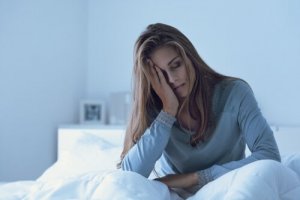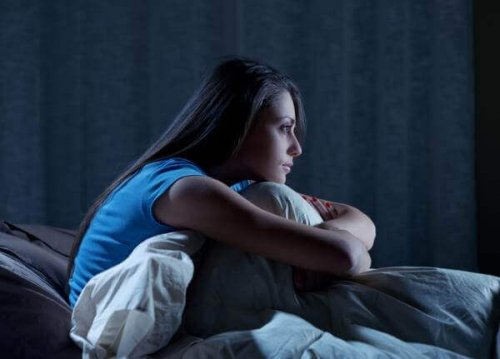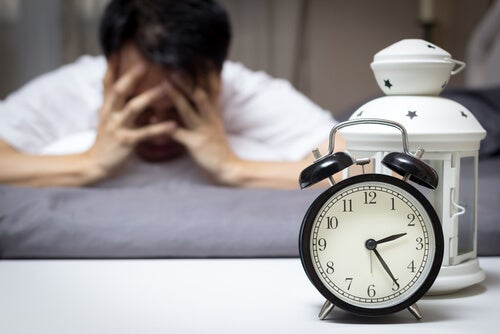Pharmacological Treatment for Insomnia

Insomnia is one of the most common disorders and affects a large part of the population. That being said, it’s necessary to learn about the pharmacological treatment for insomnia, as well as other alternatives.
Insomnia can be defined as the difficulty to start and/or maintain sleep. Sometimes, this condition is related to other organic diseases or psychological or psychiatric problems. Other times, however, it manifests without any apparent cause. Some of the symptoms that can be included in the term “insomnia” are the following:
- Difficulty falling asleep.
- Poor quality or unsatisfying sleep.
- Short-term sleep.
- Waking up in the middle of the night.
- Tiredness upon waking.
- Problems during the day related to lack of sleep, such as tiredness, lack of concentration, decreased motivation, headache, and distress.
Some experts on the matter consider that, in order for insomnia to be diagnosed, these problems have to go on for at least a month. Nonetheless, there are many different classifications and the diagnostic criteria may vary from one individual to another.
According to several pieces of research, approximately 30 percent of adults have had insomnia at some stage of their life. The prevalence of this disorder increases considerably with age and is much higher in women than in men. Moreover, some risk factors increase the likelihood of insomnia:
- Mood disorders.
- Chronic diseases.
- Neurodegenerative diseases.
- Chronic headaches.
- Menopause.
Insomnia is a condition that can affect the sufferer’s quality of life. In fact, the probability of depression and even cardiovascular disease increases among individuals who deal with this sleep disorder.
Types of treatments
To be able to establish an adequate treatment for insomnia, it’s vital to make a good diagnosis and pinpoint the causes or what triggers it. Sometimes, it’s very difficult to find out what the cause is, which may lead the individual to abuse the pharmacological treatment for insomnia without justification.
However, today we have many tools that can help diagnose this condition faster. This process is essential since it determines the type of insomnia the patient is suffering from in order to be able to apply the treatment that best suits their needs.
In fact, the first step in establishing a treatment for insomnia should always be to identify the underlying causes, the disorders that may be causing or influencing their sleep disorder.
Treatment should first focus on non-pharmacological measures. This is what we call sleep hygiene. Some sleep hygiene recommendations are:
- Maintain a sleep routine. In other words, specific hours to go to bed and wake up on a daily basis.
- Make sure your bedroom is quiet.
- Avoid drinking stimulant drinks, such as caffeine or alcohol.
- Don’t eat large amounts of food before going to bed.
- Avoid the use of technological devices, such as mobile phones or television, before going to bed.
- Try to perform relaxation techniques.
- Don’t take naps.

Pharmacological treatment for insomnia
In many cases, sleep hygiene isn’t enough to correct this disorder and it’s vital to resort to pharmacological treatment. First of all, this type of treatment should be followed only when it’s prescribed by a doctor. Self-medication for insomnia can be incredibly detrimental.
Many different drugs are used in the pharmacological treatment for insomnia:
- Hypnotics:
Benzodiazepines:
- Short-acting. Alprazolam, lorazepam.
- Medium-acting. Lormetazepam, clonazepam.
- Prolonged action. Bromazepam, chlorazepate.
Non-benzodiazepine hypnotics, such as zolpidem.
2. Antidepressants:
- Tricyclic antidepressants.
- Trazodone.
- Mirtazapine.
3. Anticonvulsants, such as gabapentin.
4. H1 antihistamines, such as doxylamine and diphenhydramine.
5. Melatonin and derivatives.
6. Valerian and other natural products.

Problems associated with the pharmacological treatment for insomnia
Although the pharmacological treatment of insomnia is effective, it can cause side effects. This, without a doubt, has caused great controversy. For example, benzodiazepines are often associated with effects such as lethargy during the day or rebound insomnia once treatment is withdrawn. Some experts also associate their use with memory problems.
These problems can get worse, especially when the patient suffers from other diseases apart from insomnia. However, when a medical professional tries to treat insomnia without pinpointing or modifying the real causes, the side effects can be even worse.
In general, it’s best to start with non-pharmacological therapies, using more natural products such as melatonin or less problematic drugs such as H1 antihistamines. In case it’s necessary to resort to benzodiazepine hypnotics, it’s best to resort to those with a short half-life, such as alprazolam or lorazepam.
If you or someone you know is suffering from insomnia, don’t hesitate to consult a doctor. They can help you and prescribe the treatment that best suits your case and needs.
Insomnia is one of the most common disorders and affects a large part of the population. That being said, it’s necessary to learn about the pharmacological treatment for insomnia, as well as other alternatives.
Insomnia can be defined as the difficulty to start and/or maintain sleep. Sometimes, this condition is related to other organic diseases or psychological or psychiatric problems. Other times, however, it manifests without any apparent cause. Some of the symptoms that can be included in the term “insomnia” are the following:
- Difficulty falling asleep.
- Poor quality or unsatisfying sleep.
- Short-term sleep.
- Waking up in the middle of the night.
- Tiredness upon waking.
- Problems during the day related to lack of sleep, such as tiredness, lack of concentration, decreased motivation, headache, and distress.
Some experts on the matter consider that, in order for insomnia to be diagnosed, these problems have to go on for at least a month. Nonetheless, there are many different classifications and the diagnostic criteria may vary from one individual to another.
According to several pieces of research, approximately 30 percent of adults have had insomnia at some stage of their life. The prevalence of this disorder increases considerably with age and is much higher in women than in men. Moreover, some risk factors increase the likelihood of insomnia:
- Mood disorders.
- Chronic diseases.
- Neurodegenerative diseases.
- Chronic headaches.
- Menopause.
Insomnia is a condition that can affect the sufferer’s quality of life. In fact, the probability of depression and even cardiovascular disease increases among individuals who deal with this sleep disorder.
Types of treatments
To be able to establish an adequate treatment for insomnia, it’s vital to make a good diagnosis and pinpoint the causes or what triggers it. Sometimes, it’s very difficult to find out what the cause is, which may lead the individual to abuse the pharmacological treatment for insomnia without justification.
However, today we have many tools that can help diagnose this condition faster. This process is essential since it determines the type of insomnia the patient is suffering from in order to be able to apply the treatment that best suits their needs.
In fact, the first step in establishing a treatment for insomnia should always be to identify the underlying causes, the disorders that may be causing or influencing their sleep disorder.
Treatment should first focus on non-pharmacological measures. This is what we call sleep hygiene. Some sleep hygiene recommendations are:
- Maintain a sleep routine. In other words, specific hours to go to bed and wake up on a daily basis.
- Make sure your bedroom is quiet.
- Avoid drinking stimulant drinks, such as caffeine or alcohol.
- Don’t eat large amounts of food before going to bed.
- Avoid the use of technological devices, such as mobile phones or television, before going to bed.
- Try to perform relaxation techniques.
- Don’t take naps.

Pharmacological treatment for insomnia
In many cases, sleep hygiene isn’t enough to correct this disorder and it’s vital to resort to pharmacological treatment. First of all, this type of treatment should be followed only when it’s prescribed by a doctor. Self-medication for insomnia can be incredibly detrimental.
Many different drugs are used in the pharmacological treatment for insomnia:
- Hypnotics:
Benzodiazepines:
- Short-acting. Alprazolam, lorazepam.
- Medium-acting. Lormetazepam, clonazepam.
- Prolonged action. Bromazepam, chlorazepate.
Non-benzodiazepine hypnotics, such as zolpidem.
2. Antidepressants:
- Tricyclic antidepressants.
- Trazodone.
- Mirtazapine.
3. Anticonvulsants, such as gabapentin.
4. H1 antihistamines, such as doxylamine and diphenhydramine.
5. Melatonin and derivatives.
6. Valerian and other natural products.

Problems associated with the pharmacological treatment for insomnia
Although the pharmacological treatment of insomnia is effective, it can cause side effects. This, without a doubt, has caused great controversy. For example, benzodiazepines are often associated with effects such as lethargy during the day or rebound insomnia once treatment is withdrawn. Some experts also associate their use with memory problems.
These problems can get worse, especially when the patient suffers from other diseases apart from insomnia. However, when a medical professional tries to treat insomnia without pinpointing or modifying the real causes, the side effects can be even worse.
In general, it’s best to start with non-pharmacological therapies, using more natural products such as melatonin or less problematic drugs such as H1 antihistamines. In case it’s necessary to resort to benzodiazepine hypnotics, it’s best to resort to those with a short half-life, such as alprazolam or lorazepam.
If you or someone you know is suffering from insomnia, don’t hesitate to consult a doctor. They can help you and prescribe the treatment that best suits your case and needs.
All cited sources were thoroughly reviewed by our team to ensure their quality, reliability, currency, and validity. The bibliography of this article was considered reliable and of academic or scientific accuracy.
- Andrea, C. S. (2013). Insomnio: generalidades y alternativas terapéuticas de última generación. Revista Médica Clínica Las Condes, 24(3), 433-441.
- Sarrais, F., & de Castro Manglano, P. (2007). El insomnio. In Anales del sistema sanitario de Navarra (Vol. 30, pp. 121-134). Gobierno de Navarra. Departamento de Salud.
- Romero, O., Sagales, T., & Jurado, M. J. (2005). Insomnio: diagnóstico, manejo y tratamiento. Rev. Med Univ Navarra, 49(1), 25-30.
This text is provided for informational purposes only and does not replace consultation with a professional. If in doubt, consult your specialist.







